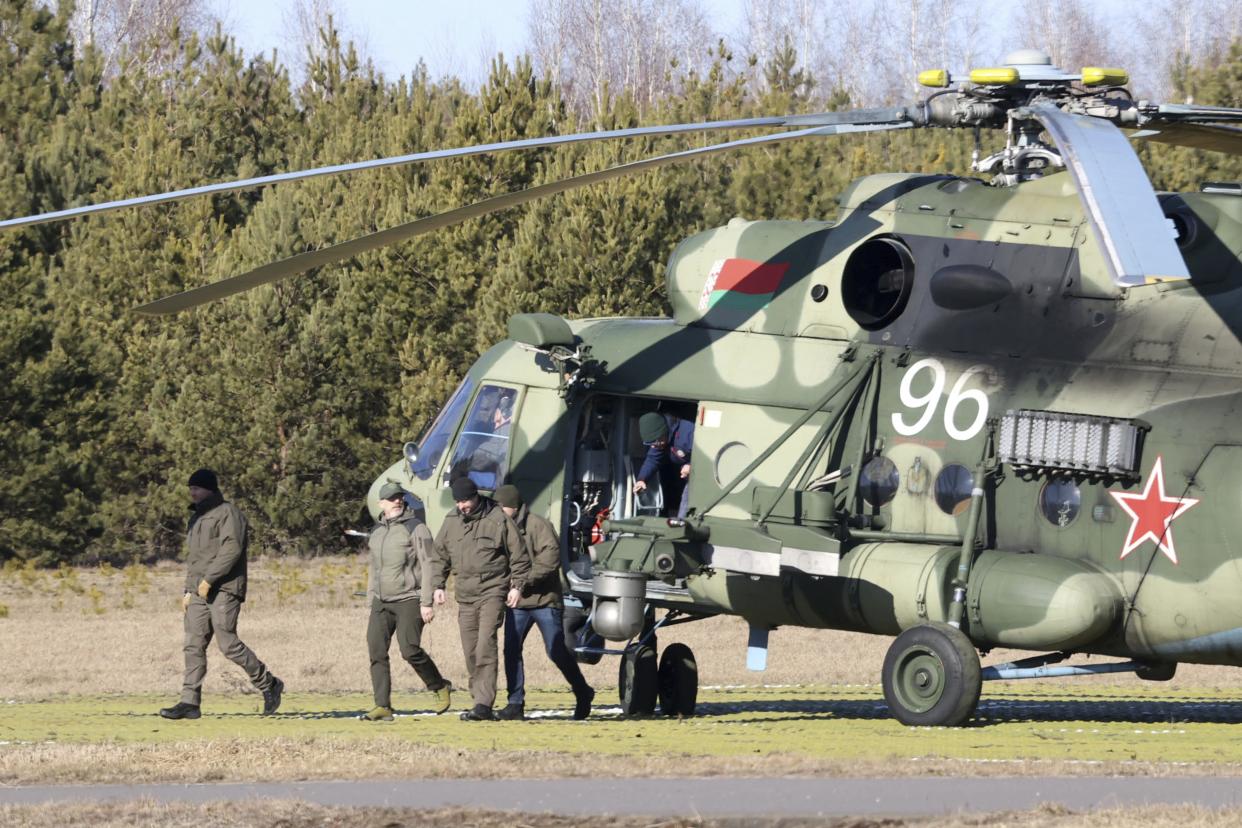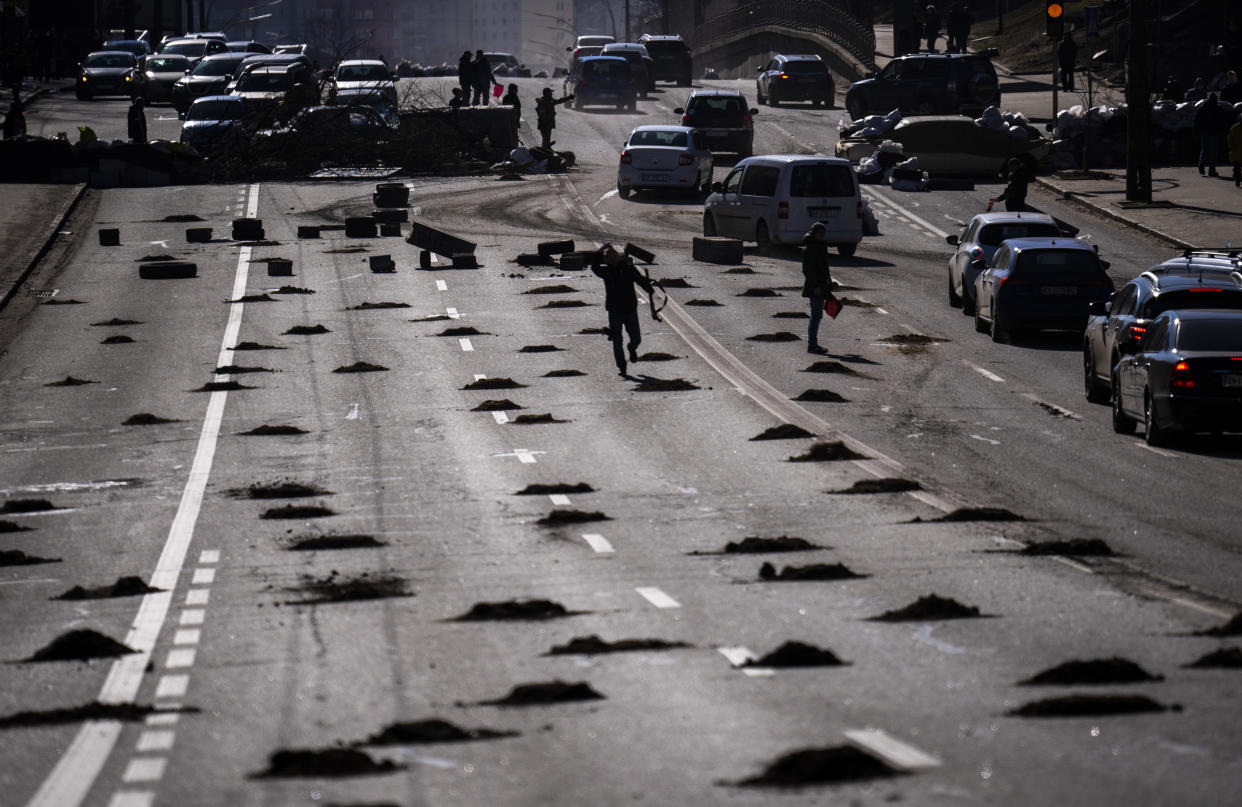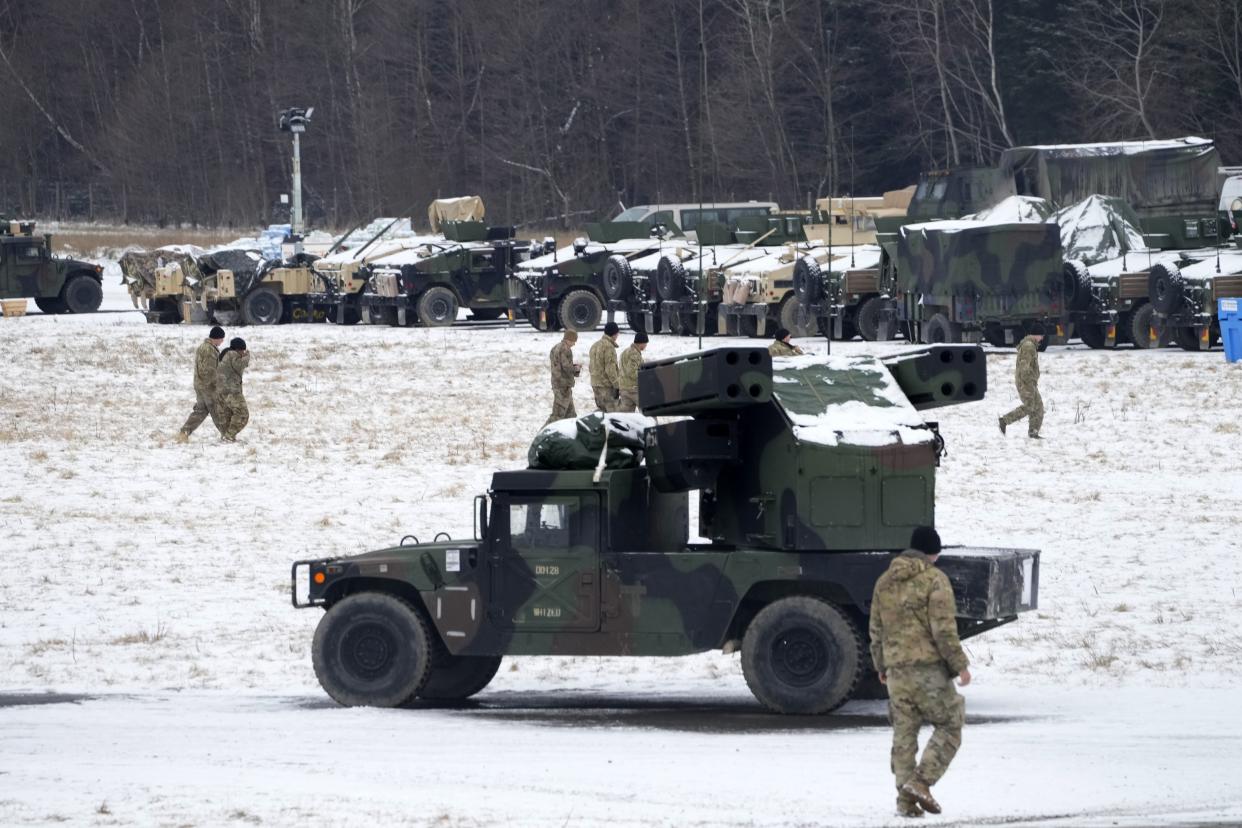Ukraine applies to join EU as first round of peace talks with Russia concludes
(AP) - An embattled Ukraine moved to solidify its bond with the West on Monday by signing an application to join the European Union, while the first round of Ukraine-Russia talks aimed at ending the fighting concluded with no immediate agreements.
Ukraine President Volodymyr Zelensky posted photos of himself signing the EU application, a largely symbolic move that could take years to become reality and is unlikely to sit well with Russian President Vladimir Putin, who has long accused the West of trying to pull Ukraine into its orbit.
Russian and Ukrainian officials held their meeting on day five of the war under the shadow of Mr Putin’s nuclear threats, and with Moscow’s invasion of Ukraine running into unexpectedly fierce resistance.
Early Monday night, a top adviser to Ukraine’s president said that the first round of talks with Russia had ended and that both delegations had returned home for consultations in their capitals.
President @ZelenskyyUa has signed application for the membership of #Ukraine in the European Union.
This is a historic moment! #EU pic.twitter.com/AZZtnhcPjL— President's Office, Ukraine (@PresidentofUkr) February 28, 2022
Mykhailo Podolyak gave few details except to say that the talks, held near the Ukraine-Belarus border, were focused on a possible cease-fire and that a second round could take place “in the near future”.
At this stage, Ukraine is many years away from reaching the standards for achieving EU membership, and the 27-nation bloc is expansion-weary and unlikely to take on new members any time soon.
Also, any addition to the EU must be approved unanimously, and some member states have complicated approval procedures.
Overall, the consensus has been that Ukraine’s deep-seated corruption could make it hard for the country to win EU acceptance.
Still, in an interview with Euronews on Sunday, EU Commission chief Ursula von der Leyen said: “We want them in the European Union.”
Meanwhile, outgunned Ukrainian forces managed to slow the Russian advance, and Western sanctions began to squeeze the Russian economy, but the Kremlin again raised the spectre of nuclear war, reporting that its land, air and sea nuclear forces were on high alert following Putin’s weekend order.

Stepping up his rhetoric, Mr Putin denounced the US and its allies as an “empire of lies”.
A tense calm reigned in Kyiv, where people lined up to buy food, water and pet food after two nights trapped inside by a strict curfew, but social media video from Ukraine’s second-largest city, Kharkiv, showed residential areas being shelled, with apartment buildings shaken by repeated, powerful blasts.
Authorities in Kharkiv said at least seven people had been killed and dozens injured. They warned that casualties could be far higher.
“They wanted to have a blitzkrieg, but it failed, so they act this way,” said 83-year-old Valentin Petrovich, using just his first name and his Russian-style middle name because of fear for his safety.
He described watching the shelling from his downtown apartment.
The Russian military has denied targeting residential areas despite abundant evidence of shelling of homes, schools and hospitals.
Meanwhile, as Russia’s Central Bank scrambled to shore up the tanking rouble, Mr Putin signed a decree governing foreign currency, in a bid to stabilise the rouble.
But that did little to calm Russian fears.
In Moscow, people lined up to withdraw cash as the sanctions threatened their livelihoods and savings.
Across Ukraine, meanwhile, terrified families huddled overnight in shelters, basements or corridors.
“I sit and pray for these negotiations to end successfully, so that they reach an agreement to end the slaughter, and so there is no more war,” said Alexandra Mikhailova, weeping as she clutched her cat in a makeshift shelter in the strategic southeastern port city of Mariupol.
Around her, parents sought to console children and keep them warm.
The UN human rights chief said at least 102 civilians have been killed and hundreds wounded in more than four days of fighting, warning that figure is probably a vast undercount, and Ukraine’s president said at least 16 children were among the dead.
More than a half-million people have fled the country since the invasion, another UN official said, with many of them going to Poland, Romania and Hungary.

And millions have left their homes.
The negotiations Monday were the first face-to-face talks between Ukrainian and Russian officials since the war began.
The delegations met at a long table with the blue-and-yellow Ukrainian flag on one side and the Russian tricolor on the other.
Mr Zelensky’s office said it would demand an immediate cease-fire and withdrawal of Russian troops.
But while Ukraine sent its defence minister and other top officials, the Russian delegation was led by Mr Putin’s adviser on culture, an unlikely envoy for ending the war and perhaps a sign of how seriously Moscow views the talks.
Also, the 193-nation UN General Assembly opened its first emergency session in decades in order to deal with the Ukraine invasion, with Assembly President Abdulla Shahid calling for an immediate cease-fire, maximum restraint by all parties and “a full return to diplomacy and dialogue”.
It was not immediately clear what Mr Putin is seeking in the talks, or from the war itself, though Western officials believe he wants to overthrow Ukraine’s government and replace it with a regime of his own, reviving Moscow’s Cold War-era influence.
The Russian leader made a clear link between ever-tightening sanctions and his decision Sunday to raise Russia’s nuclear posture.
He also cited “aggressive statements” from Nato.
Moscow’s defence ministry said that extra personnel were deployed to Russian nuclear forces and that the high alert applies to nuclear-capable intercontinental ballistic missiles, submarines and long-range bombers.
A senior US defence official, speaking Monday on condition of anonymity, said the United States had yet to see any appreciable change in Russia’s nuclear posture.

US and British officials have played down Mr Putin’s nuclear threat as posturing.
But for many, the move stirred up memories of the 1962 Cuban Missile Crisis and fears that the West could be drawn into direct conflict with Russia.
In another potential escalation, neighbouring Belarus could send troops to help Russia as soon as Monday, according to a senior US intelligence official.
Western officials say they believe the invasion has been slower, at least so far, than the Kremlin envisioned.
British authorities said the bulk of Mr Putin’s forces were about 20 miles north of Kyiv.
Messages aimed at those soldiers popped up Monday on billboards, bus stops and electronic traffic signs across Kyiv.
Some used profanity to encourage Russians to leave.
Others appealed to their humanity.
“Russian soldier — Stop! Remember your family. Go home with a clean conscience,” one read.
In other fighting, strategic ports in the country’s south came under assault from Russian forces.
Mariupol, on the Sea of Azov, is “hanging on”, said Zelensky adviser Oleksiy Arestovich.
An oil depot was reported bombed in the eastern city of Sumy.
Ukrainian protesters demonstrated against encroaching Russian troops in the port of Berdyansk.
With the Ukrainian capital of nearly three million besieged, the Russian military offered to allow residents to leave Kyiv via a safe corridor.
In a war being waged both on the ground and online, cyberattacks hit Ukrainian embassies around the world, and Russian media.
Western nations ramped up the pressure with a freeze on Russia’s hard currency reserves, threatening to bring Russia’s economy to its knees.
The US, European Union and Britain also agreed to block selected Russian banks from the Swift system, which facilitates the moving of money around thousands of banks and other financial institutions worldwide.
In addition to sanctions, the US and Germany announced they will send Stinger missiles and other military supplies to Ukraine.
The European Union, founded to ensure peace on the continent after the Second World War, is supplying lethal aid for the first time, including anti-tank weapons.
EU defence ministers were to meet to discuss how to get the weaponry into Ukraine.
A trainload of Czech equipment arrived Sunday and another was en route Monday, though blocking such shipments will clearly be a key Russian priority.


